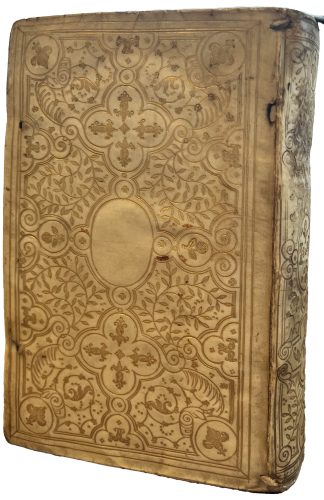POSSEVINO, Giovanni Battista.
CONTEMPORARY VELLUM ‘FANFARE’ BINDING
Dialogo dell’honore.
Venice, Gabriel Giolito, 1565.£7,500.00
8vo. pp. [88], 663, [1]. Italic letter, little Roman. Printer’s device to title and last, decorated initials and ornaments. Small hole to blank section of title, very light age yellowing, couple of ll. a trifle foxed. An excellent, clean copy in contemporary, very high-quality French vellum over boards, remains of one silk tie, triple gilt ruled, central panel with exquisite gilt ‘fanfare’ design of gouges, tendrils and fleurons, flat spine, similarly gilt, small repair to spine (label removal), all edges finely gilt and gauffered, with fleurons, interlacing ribbons and a crowned heard pierced by an arrow. c1900 label AB to fly, faded early ms ownership to title. In folding box.
The exquisite contemporary French binding is a fine example of C16 ‘à la fanfare’, from Paris or Lyon. The gauffering, showing a heart pieced by an arrow, suggests this copy was probably a gift. A similar counterpart to some of the small gilt-stamped tools can be found in BL c66b9 (France, 1581), whilst the overall design recalls the style of Nicolas Eve. This sort of hugely intricate design is much rarer on vellum than leather, the harder material being difficult for such intricate work.
This famous work on honour and nobility for the courtly reader would have made a charming present for a young aristocrat. G.B. Possevino (1522–52), older brother of the Jesuit Counter-Reformer Antonio, was at the service of Alessandro Farnese and Ippolito III d’Este. He died aged 29, and ‘Dialogo dell’honore’ was published by his brother in 1553. The work discusses all aspects of honour – the virtue at the heart of courtly life and the central question in many Renaissance tragedies – its nature, meaning and manifestations, and the ways in which it can be attacked or defended, including the controversial issue of duelling, which recurs throughout. Within this broad frame, the work addresses hundreds of different subjects, all listed in the initial table, spanning the Amazons, astrology, murder and mathematics. Book I discusses who should be considered honourable and virtuous, why honour does not equal happiness, the virtues of the honourable man, praise and flattery, and if suicide or murder can be a way of avenging one’s honour. Book II focuses on how human beings operate, how one should defend oneself from offence (e.g., a servant against their insulting patron), personal freedom, whether the stars can determine honour, and lying. Book III begins by asking whether scholars should undertake a duel in case of offence, continuing with numerous sections on honourable and dishonourable soldiers, and whether a husband or wife may lose their honour in case of adultery. Book IV examines the nature of nobility, what is just, and the merit of scholarly disciplines, including astrology. Book V is mostly concerned with duelling, its relationship with politics, social customs and the military arts, and how to undertake it with the least damage possible when it cannot be avoided. A charmingly bound copy of this important work.
USTC 851110; EDIT16 26472. Not in Gamba (but mentioned in I, p.371); Thimm, pp.229-30 (not this ed.).In stock








